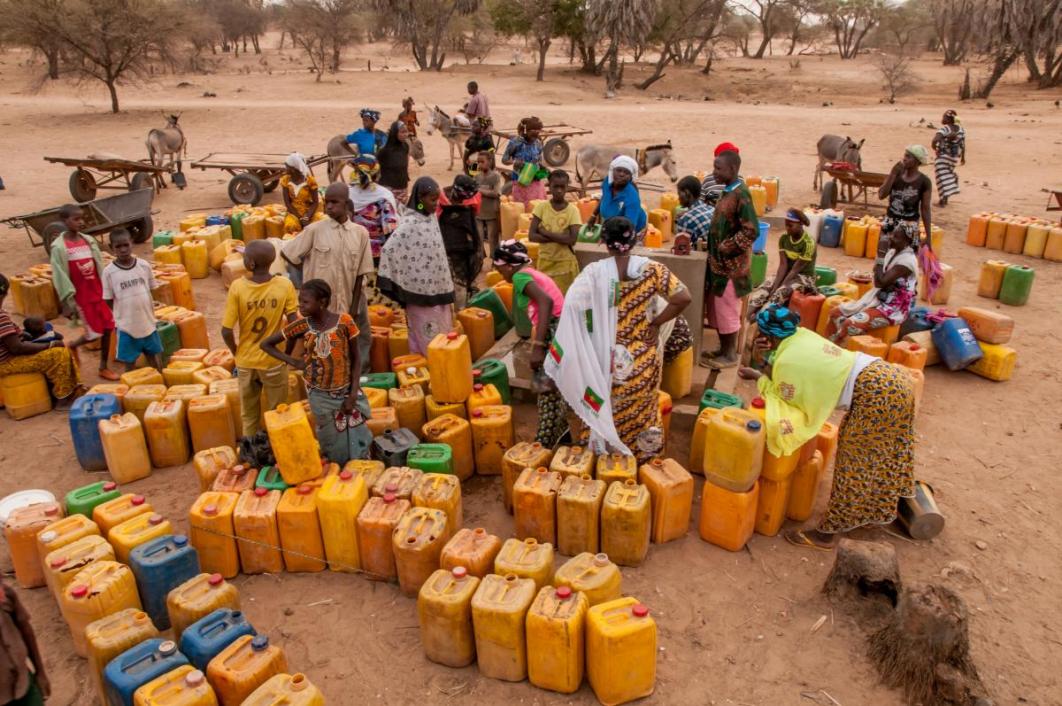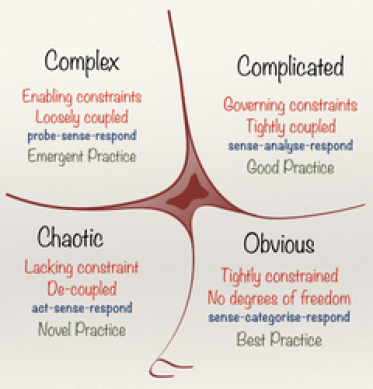Providing water and sanitation services to people who live in rural areas or informal settlements or simply aren’t connected to pipes is a complex business. Needlessly so.

Social distancing? Queuing for water in Sahel Region of Burkina Faso. Photo: IRC Burkina Faso
Published on: 19/05/2020
The COVID pandemic is shining a light on parts of water and sanitation that rarely see it. What it shows is not particularly flattering. Governments are realising that ordering utilities to provide free water to their citizens is easy, if expensive. But what about people who aren’t utility clients? People who have to crowd around unreliable handpumps or use shared latrines – all while supposedly ‘social distancing’. Who do you talk to if you want to provide free water to these people during the crisis?
This is the part of water and sanitation that calls itself WASH. A mishmash of poorly defined mandates, community management, micro-entrepreneurs, and assorted do-gooders. It is a complex picture. Needlessly so.
Whether in Ghana, Burkina Faso, Mali or Niger (see links below), we see governments struggling with the complexity of WASH. I have it on good authority that an African president (who will remain nameless to spare everyone's blushes) recently referred to his country's rural WASH sector as "chaos". In normal people's language he's not wrong. In the language of the complexity sciences I think he actually means that it is complex. But, where he is right, is that it shouldn't be either: complex or chaotic. At IRC we often call ourselves WASH systems nerds. As befits a think tank, many of us come from research backgrounds and, with my WASH systems nerd hat on, I can happily describe the complexities of the WASH sector. I can do network analyses to identify the multiplicity of actors and factors that make it up. I can write papers – and appreciate those by others – that dig into the nuances of all the complexity that makes up the WASH sector in different countries. But, increasingly, I realise that I don’t really want to anymore. The fascinating complexity is simply failure, and its failure that directly and negatively impacts on peoples' lives.

Cynefin framework by Dave Snowden
Dave Snowden is a guru to the complexity and systems communities. He developed the Cynefin framework (see image), which divides the world into the simple (or obvious), the complicated, the complex and the chaotic. A latrine or pump is simple; utility managed water or sanitation services are complicated, consisting of many moving parts: infrastructure; engineers; accountants; billing systems; clients. But, critically, all of that complication is bundled into one entity. I’ve long argued that WASH (by which I mean the informal, off-grid, un-regulated) bit of water and sanitation is complex, primarily because those moving parts are scattered over multiple actors with overlapping mandates and poorly defined relations to each other.
The point is, that as long as WASH remains complex, we will struggle to make real progress. When governments decide to provide free water in the COVID crisis, they find it is easy to do this where there’s a utility. You simply order the utility to stop billing people and, hopefully, find some money to pay them to make up the lost revenue. But what about rural areas? Who do you pay there? There’s no one utility, only a sea of clamouring voices; local governments; NGOs; entrepreneurs. If there’s one legacy I’d like to see from the COVID disaster, it would be a determined drive to create a WASH sector that is complicated and not complex, so that in the next pandemic (and there will be one), when the government decides to make water free - they will know who to ask (and who to pay) to do that.
Driving change in complex systems calls for collective action – that is, it calls for all the actors in that system to, somehow, come together in effective collaboration. This is as true of working in climate change as it is in development more broadly: multiple actors; multiple agendas; difficulty to define what success even looks like. IRC supports collective action in WASH. We bring different actors together, we support districts to create master plans, we encourage learning, sharing and above all development of a collective vision. We increasingly defined our main mission in terms of being a hub for collective action. We do this as an independent organisation, but also as part of partnerships and networks like Sanitation and Water for All, Agenda for Change or the Millennium Water Alliance.
What’s the end goal of all of this? To get water and sanitation services to everyone. By making the system strong, which above all means moving from the complex to the complicated. Because WASH shouldn’t be complex. Complexity is a sign of failure. In particular, it is a sign of a failure of leadership. In that way, the nerdy language of complexity provides a false comfort – it stops us from putting failing people and institutions on the spot. As we lovingly describe the system in all its complexity, we avoid the tough questions: why it is not clear who owns the assets for rural water supply; why are rural water agencies fighting turf wars with local government; why can no one agree on how to set and enforce tariffs; or why are there no clearly defined models for private sector involvement? Complexity in WASH arises from a failure of leadership and governance, especially a failure of national government to get to grips with the business of providing water and sanitation services: to turning the challenge from complex to merely complicated.
So, in being a hub, in supporting collective action by government, civil society and the private sector, our secret plan is to end the need for collective action. To support government to make the decisions that are needed to make WASH complicated: to identify who can provide services under what settings; to settle on the role of the private sector; to know who owns the assets; to agree who sets the tariffs and ensures compliance with standards.
I’m a systems nerd, an engineer, a systems researcher. But, frankly, I’m tired of the completely unnecessary complexity of WASH: it’s a systems failure. If you work in the WASH system, and this chimes with you, then join us. In Sanitation and Water for All, or Agenda for Change, or the Millennium Water Alliance. The WASH system needs you!
At IRC we have strong opinions and we value honest and frank discussion, so you won't be surprised to hear that not all the opinions on this site represent our official policy.